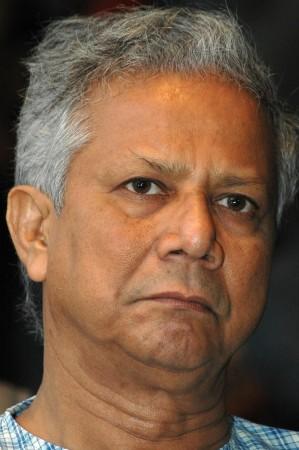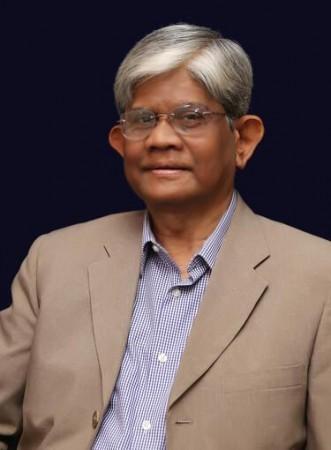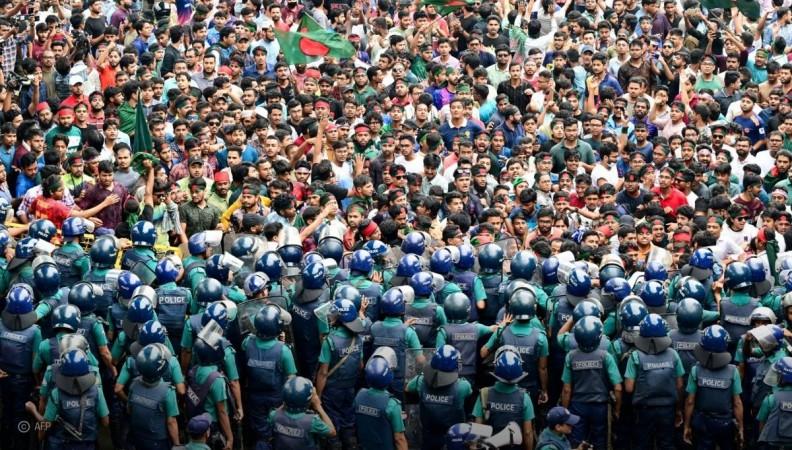
Bangladesh's newly formed interim government is being led by Nobel laureate Muhammad Yunus. The government comprises 17 members from diverse backgrounds, including former central bank governors, ex-election commissioners, law professors, and human rights activists. This diverse team is expected to guide Bangladesh through a critical period of transition, following a period of unrest that led to the resignation and flight of Prime Minister Sheikh Hasina.
Muhammad Yunus, a renowned social entrepreneur, banker, and economist, is known globally as the 'father of microfinance.' He founded the Grameen Bank in 1983, pioneering the concepts of microcredit and microfinance. In 2006, Yunus and the Grameen Bank were awarded the Nobel Peace Prize for their work in promoting economic and social development from below. Despite his prominence, Yunus had largely stayed away from the political arena, save for a short-lived stint in 2007 when he founded 'Nogarik Shakti' (citizens' power) before announcing his exit from politics later that year.
The government's key roles and portfolios align with the members' expertise, collectively aiming to address the diverse challenges Bangladesh faces during this critical period. This includes restoring political stability, promoting economic recovery, addressing social and ethnic tensions, maintaining international relations, initiating legal and constitutional reforms, and ensuring public safety and law enforcement.The government comprise of members :

Salehuddin Ahmed
Salehuddin Ahmed served as the 9th Governor of the Bangladesh Bank, the country's central bank, from May 1, 2005 to April 30, 2009. According to media reports, Ahmed implemented reforms aimed at fostering discipline in the banking sector and modernising the central bank's operations.
He started his career as a lecturer at the University of Dhaka in 1970 and a year later, joined the Civil Service of Pakistan.
Ahmed also served as Director General of Bangladesh Academy for Rural Development from 1993 to 1995. He was the Director General of the NGO Affairs Bureau at the Prime Minister's Office.
Brigadier General (retd) M. Sakhawat Hossain
M. Sakhawat Hossain was the Election Commissioner of Bangladesh between 2007 and 2012. He was a brigadier general in the Bangladesh Army and has written more than 32 books. He also serves as a columnist and freelance commentator on national and international television as a security and defence analyst.
According to Bangladeshi media, he served on the Board of Directors of Sonali Bank, the largest commercial bank in Bangladesh for two years. He attended NATO exercise in Germany.
Md Nazrul Islam (Asif Nazrul)
Also known as Asif Nazrul, Md Islam is a law professor, researcher and civil society activist. He wrote a number of book chapters and research papers on constitutional, and international legal issues in leading journals and books.
He presented papers at conferences held in the US, Europe and South Asia on constitutional reform, election integrity and good governance issues.
Adilur Rahman Khan
A lawyer by profession, Adilur Rahman Khan is a human rights activist and former Deputy Attorney General for Bangladesh. Since October 2022, Adilur Rahman Khan has been one of the Secretaries General of the International Federation for Human Rights (FIDH).
He has Masters in Law degrees from the University of Dhaka and Vrije Universiteit Brussel.
A.F. Hassan Ariff
A.F. Hassan Ariff held the office of Attorney General for Bangladesh from October 2001 to April 2005. He has been practising in the Supreme Court of Bangladesh since 1970.
He was the Law Adviser (Cabinet Minister) of the caretaker government of Bangladesh from January 2008 to January 2009.
He was enrolled as an advocate of the Calcutta High Court, West Bengal, India in 1967.
Md Touhid Hossain
Md Touhid Hossain is a former Foreign Secretary of Bangladesh.
He was born on February 1, 1955, and had completed his master's degree in history from the University of Dhaka.
He joined the Bangladesh Foreign Service in 1981. From January 1999 to February 2000, Hossain served as the Principal of the Foreign Service Academy.
Syeda Rizwana Hasan
Syeda Rizwana Hasan is a Bangladeshi lawyer and environmentalist. She is the Chief Executive of the Bangladesh Environmental Lawyers Association (Bela) and a member of the Environmental Law Alliance Worldwide, and the Environmental Law Commission of International Unions for the Conservation of Nature (IUCN).
Additionally, she is a member of the board of the South Asian Network for Development and Environmental Economics (SANDEE).
Supradip Chakma
Supradip Chakma serves as the chairman of the Chittagong Hill Tracts Development Board (CHTDB). He previously worked as Bangladesh's ambassador to Vietnam and Mexico.
According to Dhaka Tribune, Chakma, a foreign cadre of the BCS 1985 batch, also served in the Bangladesh Embassy in Rabat, Bangladesh High Commission in Colombo, Bangladesh Embassy in Brussels and Bangladesh Embassy in Ankara in various capacities.
Farida Akhter
Farida Akhter, the executive director of UBINEG (Policy Research on Development Options), has carried out extensive research in agriculture, marine fisheries, population, and development issues.
She has written several books and is a regular columnist in national dailies.
Bidhan Ranjan Roy
Bidhan Ranjan Roy Poddar is a Psychiatrist in Mymensingh. His qualifications are MBBS, DPM, and MPhil (Psychiatry). He is the Director cum Professor, Psychiatry at National Institute of Mental Health & Hospital.
Sharmeen Murshid
Sharmeen Murshid, Chief Executive Officer of the election observation group 'Brotee'.
A.F.M. Khalid Hossain
Abul Fayez Muhammad Khalid Hossain is a Bangladeshi Deobandi Islamic scholar, educator, writer, researcher, editor, international Islamic speaker and social reformer.
He was the professor and head of the Department of Islamic History and Culture at Omargani MES College and central president of the Islami Chhatra Samaj, the student wing of the Nizam-e-Islam Party.
Farooq-e-Azam
Naval commando Farooq-e-Azam is a freedom fighter who was awarded Bir Pratik.
During the liberation war, he was the deputy commander of the team formed under 'Operation Jackpot' to attack the Chittagong port.
Nurjahan Begum
Nurjahan Begum was one of the earliest associates of Professor Muhammad Yunus when the latter started the Grameen Bank Project in 1976 in the village Jobra in Chittagong district of Bangladesh.
A student of Chittagong University, Nurjahan played an important role in organising poor rural women in Grameen Bank's grassroots groups in the bank's earliest and most challenging days when rural women were hardly allowed to go out of doors and speak to non-relative males, let alone take a loan from an institution.
Nujahan was awarded the Susan M Davis Lifetime Achievement Award 2008 by the Grameen Foundation, World Summit Millennium Development Goals Award 2009, and Vision Award 2009.
Nahid Islam
Nahid Islam is a Bangladeshi student activist who was one of the main leaders of the 2024 Bangladesh quota reform movement, which later turned into the Non-cooperation movement, leading to the fall of Sheikh Hasina's government.
He was born in Dhaka in 1998 and is a sociology student of the 2016-17 batch at Dhaka University. His father is a teacher and his mother is a homemaker.
Asif Mahmud
Asif Mahmud is one of the key coordinators of the Students Against Discrimination Movement.
Hailing from Comilla, Asif is a Linguistics Department student of the 2017-18 batch at Dhaka University. He was also the president of the Chattra Odhikhar Parishad of DU.

However, the interim government faces several challenges. The political instability that led to the previous government's ousting needs to be addressed. The government may approach this by promoting dialogue, ensuring fair and transparent governance, and possibly initiating reforms to address the grievances that sparked the unrest. The economy, likely affected by the political turmoil, will need to be stabilized. Yunus, with his background in microfinance and economic development, is likely to focus on economic stimulus measures and financial sector reforms to boost growth and investor confidence.
The interim government will also need to address any ethnic or communal tensions that arose during the unrest. The diverse backgrounds of the cabinet members, with expertise ranging from finance to human rights, will enable a multi-faceted approach to these challenges, combining economic expertise with social and legal knowledge to foster a comprehensive and inclusive transition. This unique approach to governance, led by a figure known for his work in social development, could potentially serve as a model for other nations facing similar challenges in the future. This transition marks a significant moment in Bangladesh's political history, with the world watching closely as the country navigates its way towards stability and progress.









